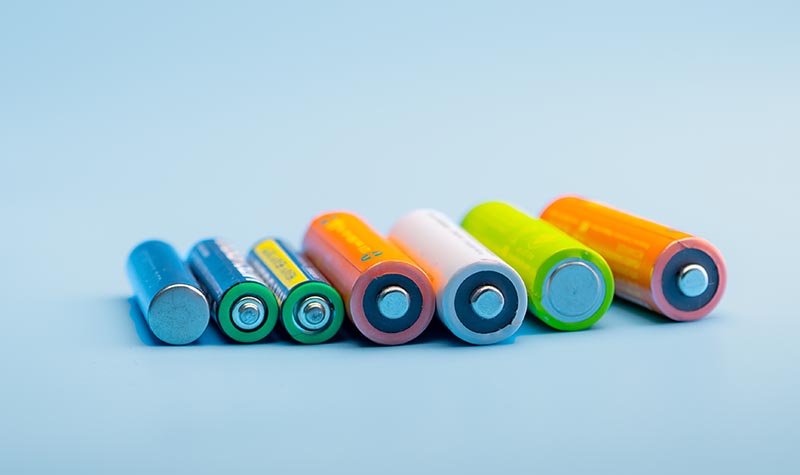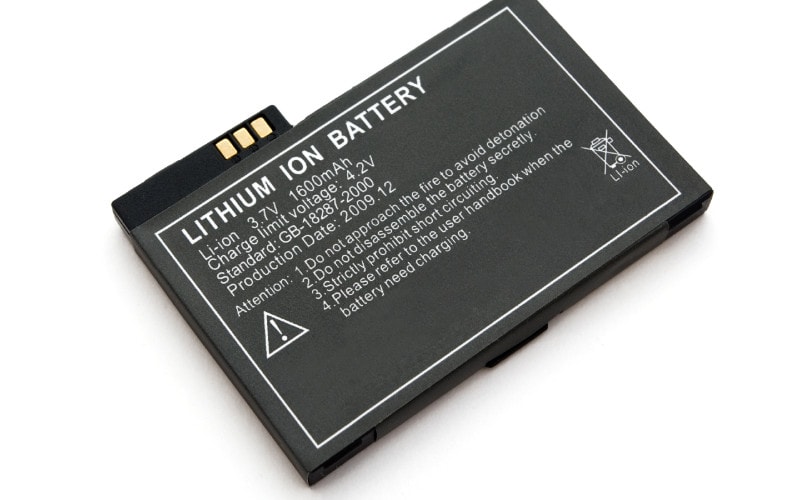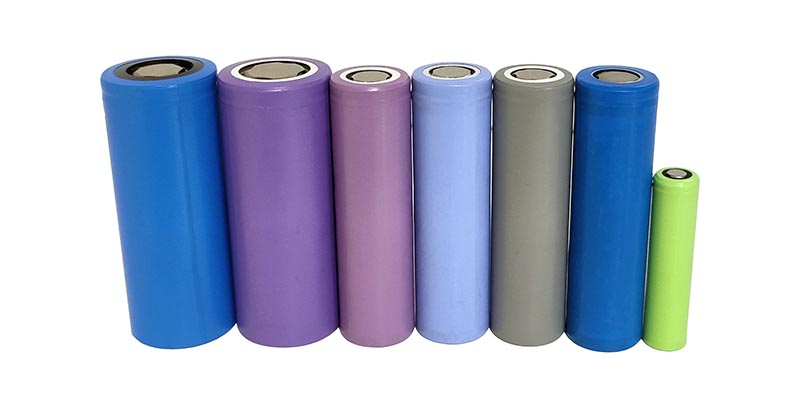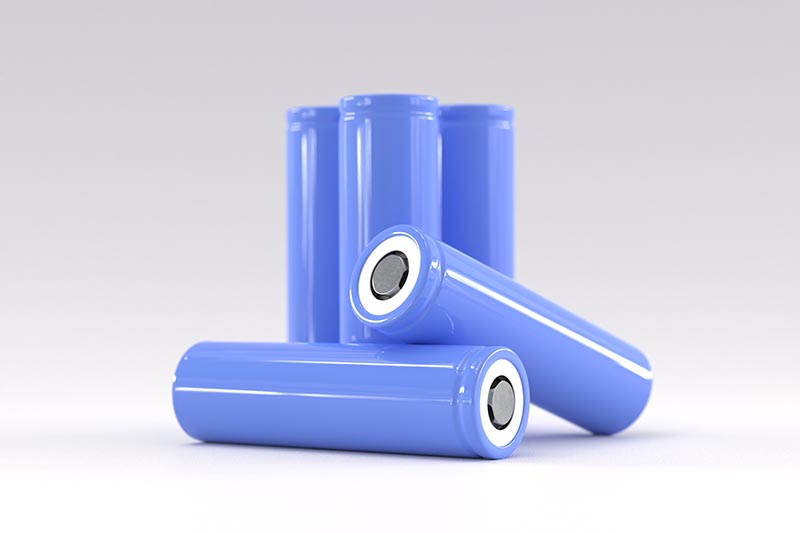How Do Lithium-Ion Batteries Work? Types, Best Uses & FAQ
-
Pete Ortiz
- Last updated:

It’s almost impossible to imagine life without lithium-ion batteries. Powering us through the day, they keep our cell phones, laptops, power tools, cars, and even our toothbrushes running reliably and making our world easier to navigate. There’s always one within arm’s reach, and it’s even a safe bet that you’re relying on a lithium-ion battery to read these words right now.
Lithium-ion batteries work by stabilizing and destabilizing lithium-ions, causing them to lose and gain electrons, which creates a charge.
And yet, despite our reliance on them, not many people could begin to explain how lithium-ion batteries work differently from an average AA. Let’s explore these modern wonders, how they operate, and why they’re only going to increase in importance as technology moves forward.
How Does a Lithium-Ion Battery Work?
The battery consists of several parts, including a separator, an electrolyte, and an anode and cathode attached to positive and negative current collectors. The negative anode and positive cathode store the lithium ions in a stable state. A layered graphite structure holds lithium-ions and electrons on the anode side, while a metal oxide holds them in the cathode. The current collectors consist of aluminum (cathode side) and copper (anode side).
A lithium-ion battery takes advantage of lithium’s reactivity and desire to lose electrons. By stabilizing and destabilizing lithium-ions by removing electrons in a controlled fashion, we can drain and recharge batteries for numerous uses.
A porous separator between the anode and cathode allows only lithium ions to pass. An electrolyte fills the space to transport the positive lithium ions. Lithium ions can move freely through the separator, whether the battery is charging or discharging, while the electrons have to take a different route. To save space, batteries contain the anode, cathode, and everything in between in thin layers rolled up into tubes (as with a Tesla battery) or folded over (e.g., a cell phone battery).

Using a Lithium-Ion Battery
When the battery has a charge and connects to a load, a pathway opens for electrons to follow from the anode to the cathode. As they’re willing to leave their associated lithium-ion, the electrons readily detach and flow to the current collector, traveling to the cathode’s electro-negative (and electron-hungry) metal oxide. Their path takes them past your device, giving it electricity and powering it on.
The positive lithium-ions also detach when the electrons leave the lithium-ions in the graphite layers. No longer in a stable state, they move from the anode through the separator via the electrolyte to refill the cathode.
Charging a Lithium-Ion Battery
In a charging state, the direction of the ion and electron flow reverses. A charger pulls electrons from the cathode and pushes them to the anode. Meanwhile, as the metal oxide returns to a more positive state due to the loss of electrons, the positive lithium ions can detach and re-enter the electrolyte. They then return to the graphite in the anode through the separator film, balancing out the charge.
What Are the Different Types of Lithium-Ion Batteries?
Lithium-ion batteries primarily differ in the metals used in the cathode. The essential types of batteries include:
- Lithium iron phosphate
- Lithium nickel manganese cobalt oxide
- Lithium cobalt oxide
- Lithium nickel cobalt aluminum oxide
- Lithium titanate
- Lithium manganese oxide
Each battery type offers unique benefits in safety, longevity, and energy and power densities. Energy density, measured in watt-hours per kilogram, refers to the storage potential relative to the battery’s size. Power density, measured in watts per kilogram (W/kg), is the amount of power output. The cost-effectiveness of one battery type depends on the application.
For example, lithium iron phosphate batteries, featuring phosphate in the cathode, offer more durability, safety, and longer lifespans than many alternatives. Lithium manganese oxide is ideal for medical equipment and power tools, given its rapid charging, high thermal stability, and specific power. Meanwhile, lithium cobalt oxide batteries have a high specific energy, providing a long-lasting charge that’s ideal for low-load applications like cell phones and cameras.

Where Is It Used?
Lithium-ion batteries are appearing in more and more electronic devices. Items as small as electric toothbrushes and wireless headphones utilize rechargeable batteries, as do machines as large as electric vehicles. Some of the more common applications for lithium-ion batteries include the following:
- Cell phones
- Laptops and tablets
- Digital cameras
- Headphones and other Bluetooth devices
- Video game controllers
- E-bikes and electric scooters
- Power tools and lawn equipment
- Solar storage devices
- Small appliances
- Vaping devices
New net-zero goals are driving the shift toward sustainability. An essential part of that effort is addressing CO2-heavy areas like transportation. In the United States, the transportation sector accounts for over one-quarter of the nation’s GHG emissions. A move toward electric vehicles could have a substantial impact, which is a primary reason that global demand for lithium-ion batteries has an expected growth of over 30 % annually by 2030.

Advantages of Lithium-Ion Batteries
Lithium-ion batteries are secondary cells; they’re rechargeable upgrades to primary batteries like AA and AAA that you can only use once. With a rechargeable, you get extended use, lowering the cost of ownership and offsetting a higher initial cost. The material demands are also fewer when you get several uses out of one unit. At the same time, rechargeable batteries reduce the amount of hazardous waste entering landfills.
Among secondary batteries, lithium-ion batteries offer several advantages in practicality and safety over lead-acid and nickel alternatives. They’re smaller and lighter in weight yet more efficient. With a low discharge rate, they maintain a superior shelf life. Charging is also much quicker and safer.
Lithium-ion batteries provide the most energy density in a rechargeable battery, allowing the lengthiest use for any device on a single charge. Their nominal voltage of 3.6V is about three times higher than similar rechargeables. And unlike other options like nickel cadmium and lead acid, they don’t require maintenance to ensure long-term performance.
Disadvantages of Lithium-Ion Batteries
Lithium-ion batteries aren’t bulletproof power sources. Aging is a notable issue, as batteries lose capacity after about a year and often fail within three. As many devices feature built-in batteries, the limited lifespan can cause problems when they wear out. They also require protection circuitry to ensure their safe operation. Voltage and temperature regulators prevent cell damage, and other mechanisms manage the current to prevent complete discharge.
Lithium-ion batteries are generally more expensive than most rechargeables due to their efficiency. But technology continues to evolve, and adoption is increasing rapidly. As lithium-ion batteries improve, their cost-effectiveness will only get better.
Frequently Asked Questions (FAQs)
Is a Lithium Battery the Same as a Lithium-Ion Battery?
A lithium battery is not the same as a lithium-ion battery. Lithium-ion batteries are rechargeable, while lithium batteries only have one use. Though less friendly to the environment, lithium batteries are beneficial for their high energy density and ability to power devices for long periods. They are also much cheaper and have a better shelf life than their rechargeable counterparts, typically lasting 4–6 times longer.

Why Does Lithium-Ion Battery Capacity Decrease Over Time?
A lithium-ion battery’s capacity can reduce over time due to the imperfect transfer of lithium-ions between the anode and cathode. In some instances, lithium-ion buildups and electrons can interact with the electrolyte to form a solid interphase (SEI). As the SEI takes in more lithium ions and electrolyte solution, it reduces the amount of lithium that can sit in the graphite. Needing an equal number of lithium-ions, the amount of electrons also decreases, thus lowering the available power.
You may also decrease battery life by draining it entirely. When too many lithium ions can transfer to the cathode, they can react with the metal oxide, creating new oxide compounds. Once you start taking metal oxide and lithium ions out of the equation in this way, it reduces the amount of potential energy stored in the cathode. To avoid wearing down your battery life, recharge your devices at around 30–40% life rather than let them run to 0%.
Conclusion
Lithium-ion batteries are the future of portable technology, offering clear economic and environmental advantages over traditional batteries. And there’s always room for improvement. While they already appear in abundance in nearly every home across the U.S. and beyond, lithium-ion batteries will only become more fundamental to our way of life as we unlock their potential.
Featured Image Credit: Fahroni, Shutterstock
Contents


